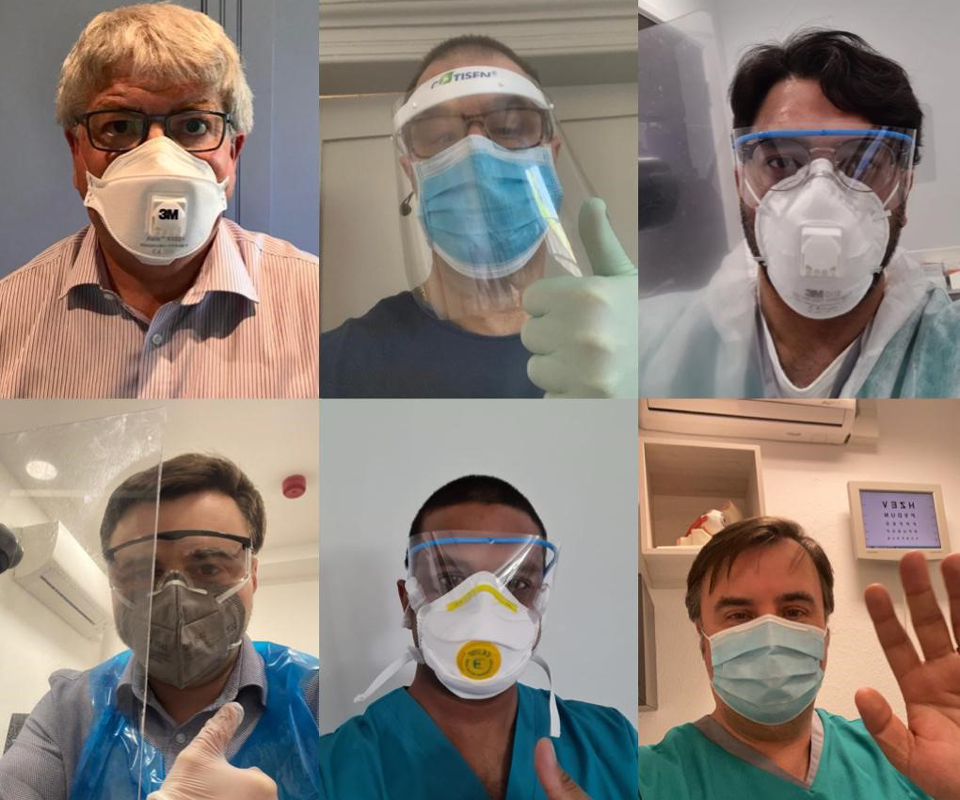- OT
- Life in practice
- Practitioner stories
- Coronavirus: on the ground in Aylesford
Coronavirus: on the ground in Aylesford
IP optometrist Dr John Gurney on a unique initiative within West Kent that has helped to ease the burden on hospitals during COVID-19

John Gurney
04 July 2020
As the coronavirus (COVID-19) pandemic transforms the way optometrists practise, OT is sharing the experiences of optometrists across the UK and beyond. If you, or a colleague, is interested in sharing your story please get in touch by email.
In a nutshell
Location: Aylesford
Years qualified: 21
Mode of practice: independent prescribing optometrist.
We started off as a small pilot to see if it was effective before it was commissioned as a service. We treat serious conditions such as uveitis and herpetic eye disease in the community to resolution. All of the IP optometrists have FP10 prescription pads. Around 95% of all eye conditions we see are treated to resolution within the community.
Our West Kent service is the only one of its kind in the UK. If there are services that are similar, they are hospital-based. I think the key to its success is teamwork. We all help each other out. We have fantastic relationships with all of our consultant ophthalmologist colleagues at the hospital. All the GPs love our service, as well as the other optometrists. We are not competing for spectacle sales; it is just a question of looking after the patients.
There are seven independent prescribing optometrists working for the service. We also have a GP with a special interest in the service. There are four main optometry practices that are involved as well as a GP clinic. They are situated at strategic points around the West Kent CCG area.

I qualified in independent prescribing in 2010. I also have a doctorate in optometry and higher qualifications in glaucoma. The reason I pursued further qualifications is that I wanted to establish a service like this and treat more patients. Our service has proved that IP optometrists can treat all of these patients safely in the community. We have proved that this works, so I think it should be a blueprint for other services throughout the UK.
We noticed a dramatic change with COVID-19. The way we practise now is completely different. I think that change will be in place for a considerable time. I never thought, in the past, that I would be prescribing for things like uveitis, herpetic eye disease and corneal eye disease remotely, but I have. I am quite happy to do that because it is in the patients’ best interests.
During lockdown, we would have a phone triage first then we might go into practice to see a patient. We are seeing the same types of cases but we are taking on even more work. We are doing post-surgical checks for patients following things like retinal detachment surgery.
I have seen retinal detachments that have required surgery and bilateral uveitis where the pressures were greater than 40. My colleague saw a patient who presented with acute open angle glaucoma. During lockdown, there were quite a few situations where we still had to see patients face-to-face. If that care wasn’t available, then more people would go blind. It’s as simple as that.
I certainly think that patients will be more spread out as we return to routine practice and we will need to be mindful of the needs of patients with certain conditions for quite some time; potentially until a vaccine is found.
We are not competing for spectacle sales; it is just a question of looking after the patients
This time has been a learning curve and it has changed the way I have practised. We have had to purchase our own PPE. There are many tests that I would normally do before COVID-19 that I don’t do anymore to reduce the time it takes to see a patient. Our business model is not based on spectacle sales but a lot of opticians have a different model, and COVID-19 is going to have a huge impact.
When I talk to other optometrists about the service, they will say ‘I wish we had it where we are.’ I think there is a big interest in developing these types of services throughout the UK. There are political factors, but we know the service works. There is no reason that it couldn’t be replicated somewhere else.
We are on first name terms with the ophthalmologists. We know their specialities. If I see a patient with a neurological problem, I can speak to Adam; if I have a vitreoretinal condition I will speak to Luke; if I have a glaucoma query, I will speak to Ejaz. They know us and vice versa. We need that symbiotic relationship between secondary care and primary care to work effectively.
• As told to Selina Powell.
Advertisement

Comments (2)
You must be logged in to join the discussion. Log in
Alibaba09 July 2020
Fantastic service and article. Come on Suffolk - we NEED the same service, especially in such a rural locality. There are IP qualified Optom’s ready and waiting to be involved. We haven’t even got a MECS in place yet. Let’s follow Kent’s lead and set up APCOS instead..
Report Like 333
Don Williams07 July 2020
Well done guys. Great initiative. All the very best. That is the forward.
I have been providing this type of service (private) for a couple of years now and my practice has really benefited from current situation.
Report Like 319